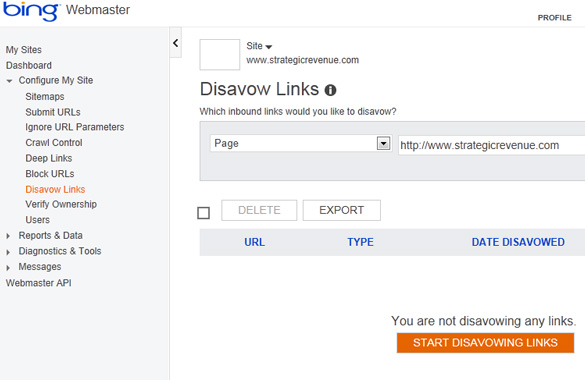Microsoft’s Bing search engine is now offering web developers a tool to disavow malicious links. Bing Webmaster Tools features a small gadget that allows people to submit domains that apparently link to a legitimate page from poor quality sites. Individual pages and directories can also be submitted in the disavow links page.
Web developers with SEO on their agenda often wish they could disavow links. Unnatural links and other black hat spam policies can hurt both a site’s page rankings and visible PageRank (on the toolbar). Since there’s nothing stopping anyone else from linking to a particular page, webmasters don’t have much control over this problems. This means that if a spam site were to link to a legitimate website, the spam site could potentially hurt the legitimate website by making it appear to search engines that the legitimate site is buying text links. Because of this, Webmasters need a way to say “hey, that’s not my link”. Does this mean that Bing is ready to follow in Google’s footsteps with their own version of Panda?
Sometime in the end of May 2012, Google’s Webmaster Tools help section (Can competitors harm ranking?) received a significant change in wording. The page was changed to admit that negative SEO linking polices can actually hurt a site’s ranking. Google now claims that while they work hard to prevent other webmasters from harming other sites, negative links can hurt rankings.
- “There’s almost nothing a competitor can do to harm your ranking or have your site removed from our index” (Before 5/22/2012 )
- “Google works hard to prevent other webmasters from being able to harm your ranking or have your site removed from our index”. (After 5/22/2012)
Currently Google has no comparable tool to the one offered by Bing but is said to be developing a similar tool, and SEO specialists are hopeful that it will help people who have been negatively affected by algorithm updates like Penguin. However, it will likely do little to change Google’s reputation among many SEO developers.
Meanwhile, Bing is enjoying increased popularity from their speedy release of such a tool, particularly when Google had been so vocal on the desire to release one soon. Bing has been trying to improve the quality of its search algorithms, and the recent Phoenix update provided many new Webmaster tools. Unlike Google’s updates, Bing’s Phoenix update has been met with quite a bit of praise.

The fact that the disavow links tool has been released illustrates the fact that all major search engines are indeed paying more attention to who links to individual web pages. Artificial links have become a serious problem. While this tool won’t make a gargantuan difference in search results, it does show that Bing is playing a little follow the leader and moving towards spam links which are created intentionally. No one can control people linking to a particular URL and Bing has never suggested they penalize you for links pointing towards you, they’ve only said they ignore links they don’t like so the release of this tool seems more a stab at Google than anything else.
Vanessa Fox, search engine optimization expert best known for her work creating Google’s Webmaster Central caught up with Duane Forrester, Sr. Product Manager and Webmaster Outreach at Bing. She asked several questions about the actual reason for the tools release and if Bing is currently targeting spam links. Forrester reponded with a somewhat vague responce:
This tool simply allows webmasters a way to alert us – a signal if you will – to the fact they don’t support a particular link (or group of links) pointing to their site. Whether from negative seo, an old paid link effort they’d like to distance themselves from, or whatever, the tools allows them to tell us how they see the link, essentially.
A beta version of a Bing SEO Analyzer has also been provided within Bing’s Webmaster Tools center which can help webmasters see if their pages are within normal tolerances. URL Removal software allows developers to block pages from Bing’s results. Website developers who originally fell for spam schemes should now be able to clean up their mess.
News stories about Bing’s tool to ignore links came almost immediately after stories about Bing’s search market share. While Google is still the dominant search engine in the United States, Bing is gaining ground. Developers should keep in mind that Yahoo searches are now actually powered by Bing’s algorithm. This means that Bing-powered searches through either the Yahoo.com or Bing.com web portals account for over 25 percent (28.25%) of all American searches.
Web developers who feel that Google has had a stranglehold on the world of search are among those praising Bing’s recent moves. Some individuals have suggested that Google isn’t playing fair, so to speak, but Microsoft is currently doing quite a few things that please Internet developers so while Google is busy battling competitors like Facebook and Apple, they shouldn’t take their eye off of Microsoft as a good number of these developers are just looking for a reason to jump ship.

About The Author: John Colascione is Chief Executive Officer of Internet Marketing Services Inc. He specializes in Website Monetization, is a Google AdWords Certified Professional, authored a ‘how to’ book called ”Mastering Your Website‘, and is a key player in several Internet related businesses through his search engine strategy brand Searchen Networks®

 *** Here Is A List Of Some Of The Best Domain Name Resources Available ***
*** Here Is A List Of Some Of The Best Domain Name Resources Available ***
Leave a Reply